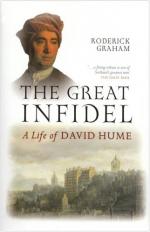|
This section contains 11,862 words (approx. 40 pages at 300 words per page) |

|
SOURCE: “Religious Eloquence: Hume on the Passions That Unite Us,” in The Fate of Eloquence in the Age of Hume, Cornell University Press, 1994, pp. 159-88.
In this essay, Potkay explores Hume's ambivalence toward rhetoric and evaluates his attempt “to preserve the coalescent power of eloquence in the very act of dissolving the bonds of religion.”
James Boswell writes: “On Sunday forenoon the 7 of July 1776, being too late for church, I went to see Mr. David Hume, who was returned [to Edinburgh] from London and Bath, just a dying. I found him alone, in a reclining posture in his drawing room. He was lean, ghastly, and quite of an earthy appearance.” In his last interview with Hume, Boswell attempts to make the “great Infidel” admit to a belief in a future state, or at least to some uneasiness concerning the prospect of annihilation. To Boswell's mortification, however, Hume “seemed...
|
This section contains 11,862 words (approx. 40 pages at 300 words per page) |

|


